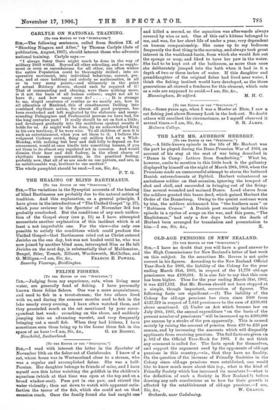CARLYLE ON NATIONAL TRAINING.
[TO THE EDITOR OF THE "
Sxn,—The following sentences, culled from Section IX. of "Shooting Niagara and After," by Thomas Carlyle (date of publication, August, 1867), should interest those who advocate national training. Carlyle says :—
"I always fancy there might much be done in the way of military Drill withal. Beyond all other schooling, and as supple- ment or even as succedaneum for all other, one often wishes the entire Population could be thoroughly drilled ; into co- operative movement, into individual behaviour, correct, pre- cise, and at once habitual and orderly as mathematics, in all or in very many points,—and ultimately in the point of actual Military Service, should such be required of it! That of commanding and obeying, were there nothing more, is it not the basis of all human culture; ought not all to
have it ; and how many ever do? It is strange to me, stupid creatures of routine as we mostly are, how in all education of Mankind, this of simultaneous Drilling into combined rhythmic action, for almost all good purposes, has been overlooked and left neglected by the elaborate and many- sounding Pedagogues and Professorial persons we have had, for the long centuries past ! It really should be set on foot a little ; and developed gradually into the multiform opulent results it holds for us. As might well be done, by an acknowledged King in his own territory, if he were wise. To all children of men it is such an entertainment, when you set them to it. I believe the vulgarest Cockney crowd, flung out million fold on a Whit- Monday, with nothing but beer and dull folly to depend on for amusement, would at once kindle into something human, if you set them to do almost any regulated act in common. And would dismiss their beer and dull foolery, in the silent charm of rhythmic human companionship, in the practical feeling, probably new, that all of us are made on one pattern, and are, in an unfathomable way, brothers to one another."
The whole pamphlet should be read.—I am, Sir, &c., P. T. G.


























































 Previous page
Previous page